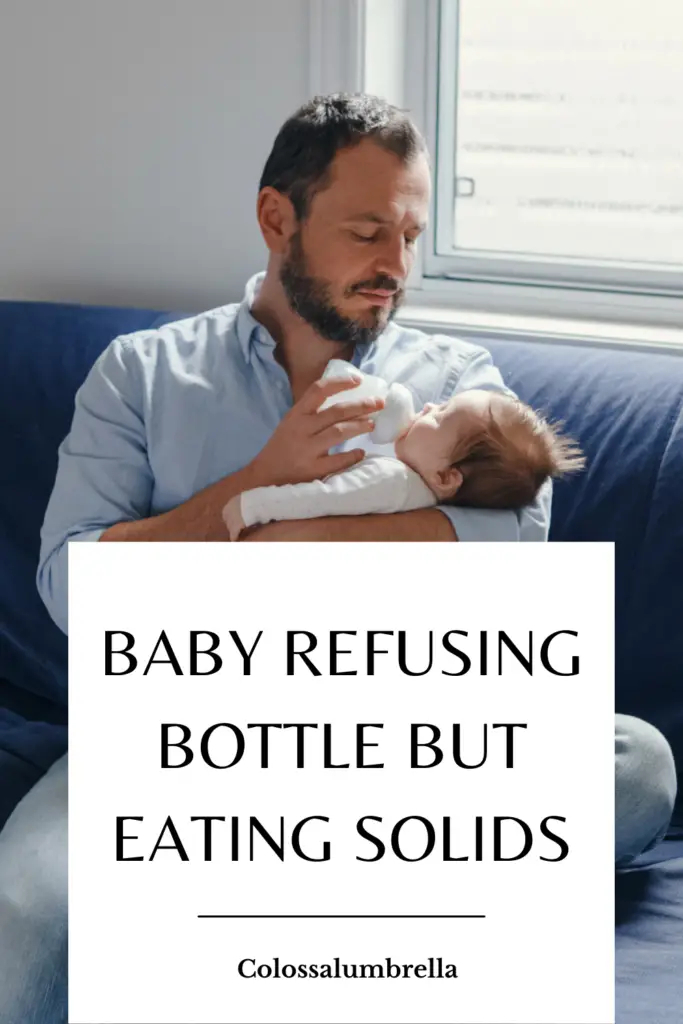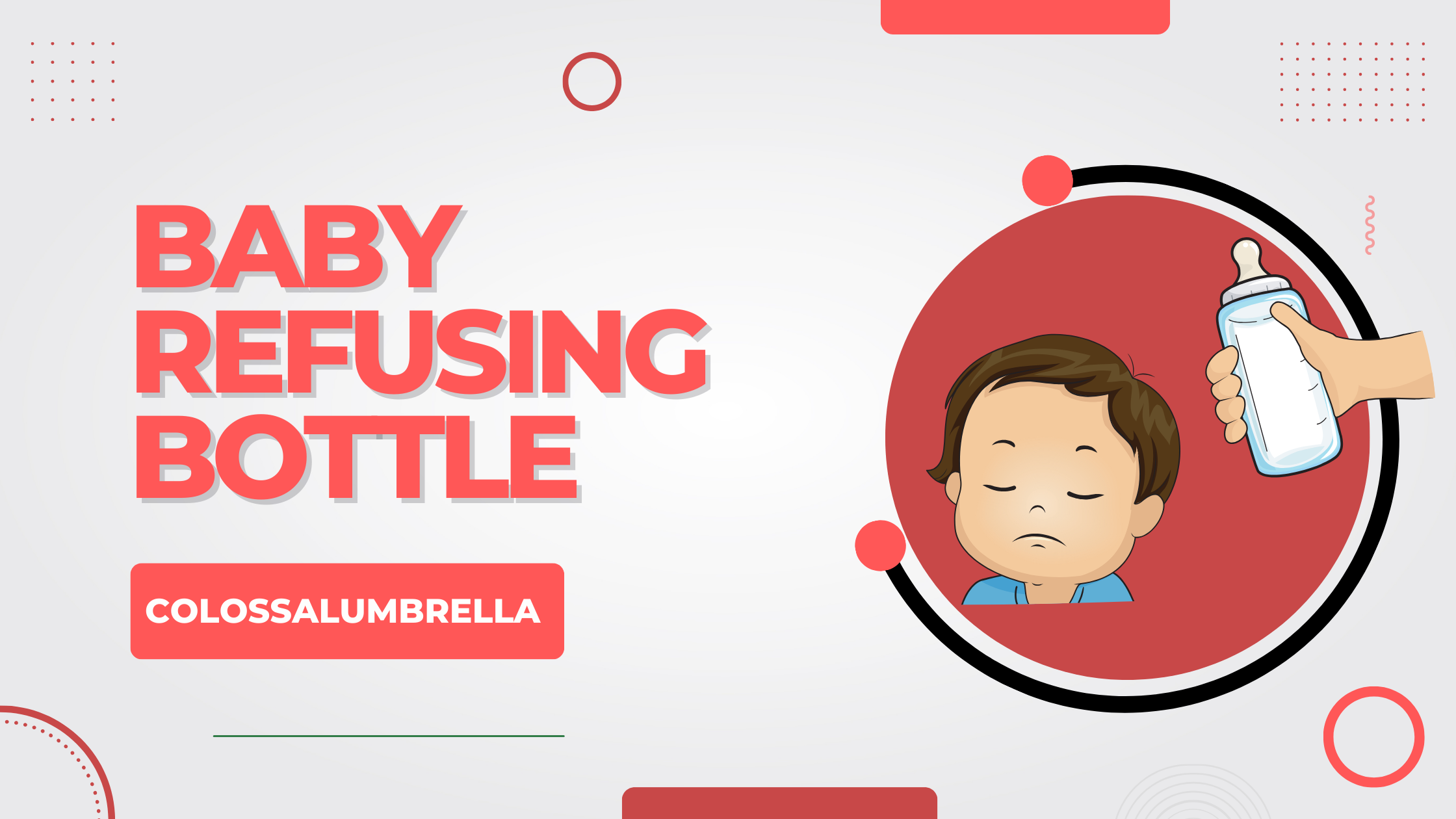Contents
As a parent, you may find yourself feeling somewhat unsettled when your 8 month old refusing bottle but eating solids. This transition in eating habits can understandably trigger worries about whether your little one is receiving the necessary nutrients. It’s only natural for questions about the normalcy of this behavior to arise. To provide you with valuable insights, this blog posts takes a closer look at the possible factors contributing to this shift and provides practical guidance for parents who may find themselves navigating this unique stage of their child’s development.
Why 8 Month Old Refusing Bottle but Eating Solids
At around 8 months of age, many babies have already started exploring solid foods alongside their regular milk feeds. It is not uncommon for them to show a preference for solids while becoming less interested in milk from the bottle or breast. This shift in behavior can be attributed to several factors, including developmental milestones, teething, and a growing curiosity about different tastes and textures.
Subscribe to my blog for Parenting tips that will make you feel like a pro, and get access to exclusive free Printables that will keep your little ones busy and happy!
Possible Reasons for baby suddenly refuses a bottle
- Developmental milestones: As babies grow, they become more independent and eager to explore new experiences. This can lead to a decreased interest in bottle feeding as they discover the excitement of self-feeding and trying different solid foods.
- Teething discomfort: The teething process can cause discomfort in a baby’s gums, making sucking on a bottle nipple less appealing. They may prefer the relief provided by chewing on soft solids instead.
- Preference for solid foods: As babies explore a variety of tastes and textures, they may develop a preference for solid foods over milk. This preference can be influenced by their curiosity and the sensory experience of eating solids.
- Bottle aversion: Some babies may develop an aversion to the bottle itself, possibly due to negative associations with feeding, such as discomfort or forceful feeding experiences.
- Slow flow or unsuitable nipple: Babies may become frustrated with a slow-flow nipple, leading them to refuse the bottle. Similarly, a nipple that does not suit their feeding style can also contribute to bottle refusal.
- Distractions and environmental factors: At this age, babies are becoming more aware of their surroundings and may be easily distracted during feeding. Noisy or stimulating environments can make it challenging for them to focus on the bottle.
Ensuring Adequate Nutrition
While it can be concerning when your baby suddenly refuses a bottle, it’s important to remember that they are likely still receiving adequate nutrition from solids and other sources. Here are some tips to ensure your baby’s nutritional needs are met:
- Offer a variety of nutritious solids: When baby wont take a bottle, continue to introduce a wide range of nutrient-rich solid foods. Include fruits, vegetables, whole grains, and proteins in their diet to ensure they receive a balanced mix of vitamins and minerals.
- Encourage self-feeding: As your baby becomes more adept at eating solids, encourage them to self-feed. Offer appropriate finger foods that they can grasp and explore independently, promoting their fine motor skills and independence.
- Monitor milk intake: Keep an eye on the amount of milk your baby consumes throughout the day. While the baby wont take a bottle, they may still be breastfeeding or taking milk from a cup. Ensure they are getting enough milk to meet their nutritional needs.
- Try different feeding methods: If your baby is refusing the bottle, consider offering milk in alternative ways, such as a sippy cup or a straw cup. Some babies may prefer these methods over the traditional bottle.
- Consult with a healthcare professional: If you have concerns when your baby refuses the bottle or baby’s growth, it’s always best to consult with a pediatrician or a healthcare professional. They can assess your baby’s specific situation and provide tailored advice and guidance.
Strategies to Help Your Baby baby refusing the bottle
If your 8 month old refusing the bottle but eating solids, there are several strategies you can try to encourage them to accept it. Keep in mind that every baby is unique, so it may take some trial and error to find what works best for your little one. Here are some tips to help you navigate this phase:
- Create a Calm and Comfortable Feeding Environment – Find a quiet and peaceful spot for feeding to minimize distractions. Ensure the temperature of the room is comfortable for your baby. Use a comfortable feeding position that allows for close bonding and eye contact.
- Experiment with Different Bottles and Nipples – Try different bottle brands and nipple types to find the one that your baby prefers. Consider the flow rate of the nipple and choose one that matches your baby’s feeding style. Experiment with bottle materials, such as glass or BPA-free plastic, to see if your baby has a preference.
- Introduce the Bottle During a Relaxed State – Offer the bottle when baby is calm and not overly hungry or tired. Avoid waiting until your baby is extremely hungry, as they may become more agitated and resistant to the bottle.
- Gradually Transition from Breast to Bottle – If your baby is primarily breastfed and refusing the bottle, try gradually introducing the bottle alongside breastfeeding sessions. Start by offering small amounts of pumped breast milk in the bottle and gradually increase the bottle feeds while decreasing breastfeeding sessions.
- Seek Support from a Lactation Consultant – A lactation consultant can provide valuable guidance and support during this transition phase. They can offer personalized advice based on your baby’s specific needs and help address any challenges you may be facing.
- Offer Distraction-Free Bottle Feeds – Distractions could be one of the reason for baby refusing the bottle. Minimize distractions by feeding your baby in a calm and quiet environment. Avoid using screens or toys during bottle feeds, as they can divert your baby’s attention away from feeding.
- Try Different Temperatures and Textures – Experiment with the temperature of the milk to find what your baby prefers. Some babies may prefer warmer milk, while others may prefer it at room temperature. Gradually introduce thicker textures by mixing small amounts of baby cereal or purees with the milk, if appropriate for your baby’s age and development.
- Stay Patient and Persistent – Remember that this phase may take time, and it’s essential to stay patient and persistent. Offer the bottle consistently and calmly, even if your baby initially refuses. It may take several attempts before they take a bottle.
- Seek Emotional Support – It can be emotionally challenging for parents when their baby suddenly refuses the bottle. Reach out to your partner, family, or friends for emotional support during this time. Joining parenting support groups or online communities can also provide a valuable space to share experiences and seek advice from other parents who have gone through similar situations.
- Trust Your Baby’s Hunger Cues – While it’s essential to encourage your baby to accept the bottle, it’s also crucial to trust their hunger cues. If your baby consistently refuses the bottle but is thriving and showing signs of satisfaction with solid foods, they may be receiving adequate nutrition from other sources.

FAQs – How to help baby take a bottle
Is it normal for an 8 month old to refuse the bottle but still eat solids?
Yes, it is relatively common for babies around 8 months old to start showing a preference for solid foods and become less interested in milk from the bottle or breast. This shift in behavior can be attributed to various factors, including developmental milestones, teething discomfort, and a growing curiosity about different tastes and textures.
How can I ensure my baby is getting enough nutrition if they baby wont take a bottle?
If your baby wont take a bottle but interested in eating solids, there are several steps you can take to ensure they receive adequate nutrition. Offer a variety of nutritious solid foods, monitor their milk intake from other sources, and consult with a healthcare professional if you have concerns about their growth or nutrition.
When should I seek medical advice for my baby’s bottle refusal?
While it is common for babies to go through phases of bottle refusal, there may be instances where it’s essential to seek medical advice. If your baby suddenly refuses a bottle and shows signs of dehydration, weight loss, or other concerning symptoms, consult with a pediatrician or healthcare professional.
How long does the bottle refusal phase typically last?
The duration of the bottle refusal phase can vary for each baby. Some may quickly adjust and accept the bottle again, while others may take more time. With patience, persistence, and implementing the strategies mentioned above, you can help your baby transition back to accepting the bottle.
Conclusion
If your 8 month old refusing bottle but eating solids, it can be a challenging phase for both you and your little one. Remember that this behavior is often a normal part of their developmental journey and may be influenced by factors such as teething, developmental milestones, and a growing preference for solid foods.
By creating a calm feeding environment, experimenting with different bottles and nipples, and seeking support from lactation consultants, you can navigate this phase with patience and understanding. Trust your baby’s hunger cues, offer a variety of nutritious foods, and consult with healthcare professionals if you have any concerns about their nutrition or growth. With time and persistence, you can help your baby transition smoothly through this phase and continue to provide them with the nourishment they need for healthy growth and development.
baby suddenly refuses a bottle
Disclaimer: The content of this blog is for informational purposes only and is not intended to be a substitute for professional medical advice, diagnosis, or treatment. Always seek the advice of your physician or other qualified healthcare providers with any questions you may have regarding a medical condition.
I would stay connected and keep you updated with parenting tips, pregnancy guides, creative ideas, easy crafts, and Free Printables. Subscribe to Colossalumbrella to get new ideas delivered to your inbox. Follow me on Facebook, Pinterest, Twitter, and Instagram.
